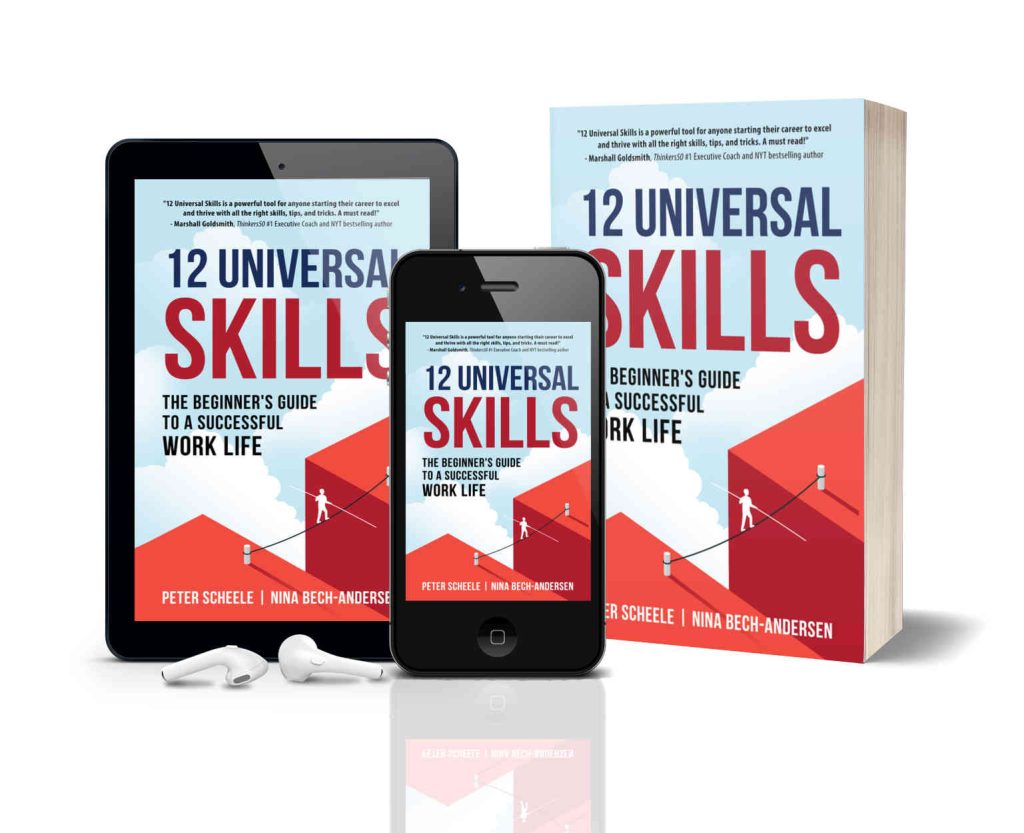The 12 Skills
At work, soft skills are just as important as hard skills. But what exactly are workplaces looking for, and why? Which soft skills should you have in your toolbox?
Here is a quick overview of the 12 most important soft skills.
#1: Building Self-Awareness
To develop yourself in your job, you must continuously improve your self-awareness. In a way, self-awareness is the most important skill of them all, as it is the fundamental building block for all the other skills.
There’s a big upside to gaining more self-awareness: you have natural strengths that you’re probably not aware of – or don’t use much – that can be brought to your attention with improved self-awareness.
These strengths are your hidden potential. When you know this potential, new possibilities open up: natural strengths that weren’t relevant for academic performance may be vital at work – for example, strengths within influencing or relationship-building.
#2: Setting Goals
Your career goals shouldn’t be set in stone at the start of your career. Because you might miss out on what is best for you.
You will want to use the hard skills you have gotten from your education, but when you have little or no experience, it isn’t easy to know which exact jobs, roles, and cultures fit you the best.
Consequently, the beginning of your career should be a learning process where you gain insight into what is important to you, what gives you energy, and what to avoid – so you can set goals that are right and meaningful for you.
#3: Building Confidence
Confidence is the degree to which you believe the result will be positive when you do an activity. It’s important that you feel competent and confident in what you do – both for your well-being and your career.
Everyone wants confidence, either to be more confident in skills we already master – or to build confidence from scratch in entirely new areas.
Therefore, it’s essential to learn the methods to use to build and boost your confidence.
#4: Building Resilience
Everybody will experience frustrations, disappointments, conflicts, and failures at work. Projects run over time and budget, you make mistakes, your manager treats you unfairly, and so on.
Correspondingly, everybody will experience negative emotions at work from time to time. That is unavoidable ... but you can learn how to bounce back instead of being knocked out.
So it’s all the more important to understand the best techniques that help you bounce back. What works best for each individual is a personal thing; what’s important is that you do something about it when you’re hit by adversities.
#5: Professional Behaviors
At work, people with completely different backgrounds and values often have to work together. So, certain norms and rules exist to ensure smooth and constructive interactions. These norms are also known as professional behaviors or business etiquette.
It is expected that everyone inherently knows what they are and that they follow them. And that is fine if you know what they are – but without that knowledge, you are at a disadvantage!
Make sure you don’t stand out for the wrong reasons but instead gain respect for your professionalism and social skills.
#6: Communication
Communication at work is not only necessary but the foundation for working together in the same direction.
Therefore, communication is a significant part of everyone’s job ... actually, in many jobs, communication is the biggest part of the job. What makes the difference is the quality of that communication.
But what is professional communication? When should you use which communication channel? What should you be aware of when writing emails? How do you communicate in tricky situations, including communicating with angry and unreasonable people, giving corrective feedback, etc.?
To live up to expectations, you need to have at least acceptable communication skills. And if you nail them, you will shine.
#7: Teamwork
Even when you work alone, you are still part of a team. Somebody is always dependent on you, as you are dependent on someone else.
Like parts in a machine, team members work together, dependent on each other for optimal results. In a good team, people trust each other, dare discuss ideas and issues and hold each other accountable.
For that reason, it is part of your job – even if it isn’t articulated – to be a professional team member. The expectation is that you know this and that you, at minimum, can work constructively with others in a team.
But as you seldom get to choose who you work with, you need to know essential team skills like how to build trust, manage disagreement constructively, and take responsibility.
#8: Working with Your Manager
Your manager is the most important person for your job satisfaction and career opportunities. It is your manager’s job to ensure that you are effective and happy in your job – and to support and guide you.
But if your manager is not satisfied with your contribution – with what you deliver or your behavior – he or she will see you as a problem.
That is why meeting expectations isn’t something you should leave to chance by doing what you think is right – or wait for your next performance appraisal to hear if you lived up to your boss’s expectations.
Instead, you should continuously align expectations, get feedback, and do your part to ensure that you have a good relationship with your leader. And with a good relationship, he or she will likely invest more money and time in your professional development and training – in your future.
#9: Time Management
Your time is your most important and valuable asset at work.
Unfortunately, it is easy to fall into the trap of spending that precious time on things with little importance or value – time wasters.
Time wasters can be hard to identify if you don’t know what to look for; they come in all disguises, including misunderstandings! They eat away at your time, leaving little or no time to do your most important work – the work that creates real value and results.
The keys to being a top performer and avoiding stress are the skills and techniques to take control of your time, prioritize your time, say no, and set limits for yourself. That also helps you maintain a healthy work-life balance.
#10: Decision Making
In a typical workday, you will be expected to make many small and big decisions to do your job.
Some of them may be difficult and involve weighing a lot of information and deciding between several options, of which none may stand out as optimal.
So it isn’t always straightforward to make decisions! That is why good decision-making skills are crucial in many jobs ... and highly valued by professional leaders.
You will be expected to know which decisions are within your authority – and which are not. And, importantly, to work out the risks and consequences of your decisions. In short, you need to understand the best practices of decision-making – so you can live up to your professional responsibilities.
#11: Networking
Building a network is vital for both your career and well-being. A strong network is important for your professional development; it makes you more resilient and helps you find new and exciting opportunities.
A good network will also make you more effective in your job; make it easier to get things done quickly and efficiently. Additionally, having a strong network equals influence – and relationship-based influence may be as valuable as formal authority and power.
Thus, knowing how to create and build your network is essential, including, e.g. how to prioritize your networking activities, how to use LinkedIn, how to seek out and meet new people, and more.
#12: Getting and Applying Influence
The first 11 skills are strongly linked to influence; mastering them translates into a well-earned reputation and consequently gives you influence.
So, to get influence, you must first build a track record of solid performance. Because influence is earned. There is no influence without having first proved yourself. Thus, you have to start by establishing that you can deliver the value you’re expected to – including picking up essential soft skills like behaving and communicating professionally, being a proper team player, working well with your manager, making sound decisions, and so on. Together with your hard skills, that’s your foundation for influence.
Building on that foundation, some proven influencing techniques can help you get more influence and apply it when you need to.
#13: Job Search (Appendix)
Like any other skill, job search can be learned. And with your knowledge about the 12 universal skills, you’re in an excellent position to go job hunting.
Understanding the 12 universal skills will also make you a much more attractive candidate for employers (that’s why they are also called employability skills). And it helps you better understand yourself: understanding which soft skills and strengths you already possess will help guide you to the jobs and organizations that fit best for you.
However, to successfully search for jobs, you need to understand the do’s and don’ts. Job hunting is too important to be something you let depend on luck; you need a reliable, systematic approach. And the better your job search skills are, the higher the odds of getting the type of employment you dream of.
How the hiring process works is no secret; HR and recruitment officers are very open about what they look for and what they do when screening candidates. And their expectation is that you do your research, write a proper resume and cover letter, and give sensible and professional answers to their interview questions.
The book’s job search appendix contains a 24-step job search guide that works equally well for applying for graduate programs, trainee positions, internships, and apprenticeships.


